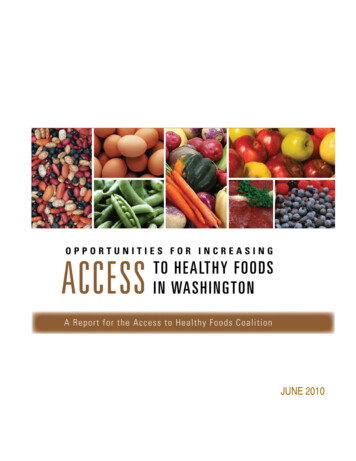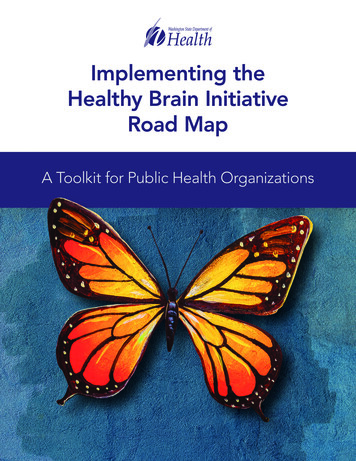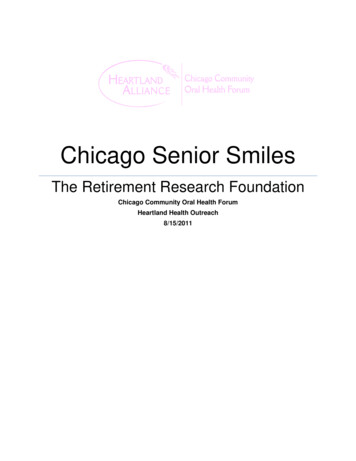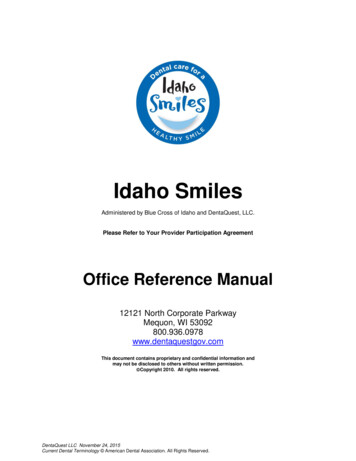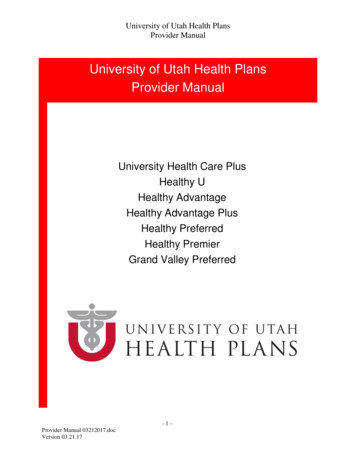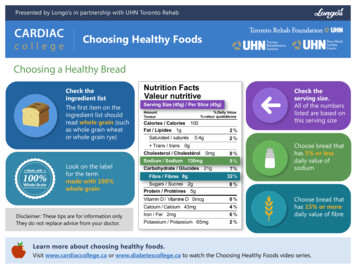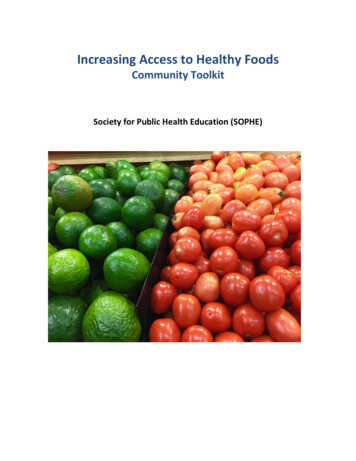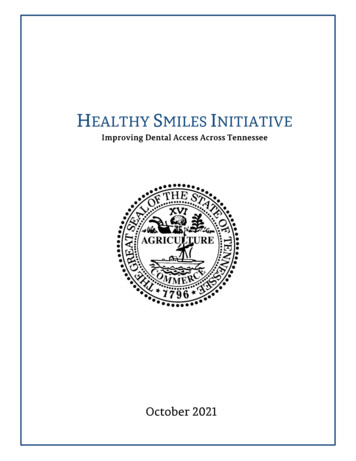
Transcription
HEALTHY SMILES INITIATIVEOctober 22, 2021Statement of NeedOral health services in Tennessee, particularly among high-risk and underservedpopulations, are severely deficient. Oral health problems can be medically dangerous, butalso have important social and economic consequences. Among low- and middle-incomeTennesseans, 40% say life is less satisfying due to dental conditions, and 16% say theappearance of their mouth and teeth affects their ability to get a job.1 Nationally, morethan 45 billion is lost in U.S. productivity due to untreated dental disease.2There is inadequate funding for current safety net services, as well as an inadequate dentalworkforce to meet the demand even if funding were sufficient. Among adults in Tennessee,9.9% are uninsured3 and 7.6% are on Medicaid4 (with no dental benefits except for adultmembers with intellectual and developmental disabilities, or adult pregnant members), whichrepresents over 1.2 million people with no access to dental coverage.Tennessee ranks 45th in the nation for the ratio of population to dentists. Nationally, thereare approximately 60 dentists per 100,000 population, compared with 46/100K inTennessee (commonly as low as 20/100K in some parts of Appalachia).5 It is estimated thatthe state would need over 700 additional dentists to meet the current standard.Tennessee has six counties without a dentist, and a 2021 Health Resources and ServiceAdministration data shows 89 counties were partially or fully designated as Dental HealthProfessional Shortage Areas (HPSA).6 Over 2.3 million Tennesseans, nearly 1/3 of thepopulation, live in a Dental HPSA.In addition to the current shortage of dentists, the American Dental Association's mostrecent report, Supply of Dentists Working in the U.S.: 2001-2020, states that among the200,000 dentists currently working in the United States, approximately 40% will be ofretirement age in 2030.7 At this rate, almost 1300 of Tennessee’s 3,247 current dentists willretire in the next 10 years. Furthermore, the COVID-19 pandemic has accelerated the l-health-in-tennessee/Centers for Medicare and Medicaid Services. 2018 National Health Expenditure Data. NHE Tables; Table12: l icon3Impact of TennCare Report 2020 – The University of Tennessee Knoxville, Boyd Center for Business and EconomicResearch 0 0.pdf4TennCare Enrollment Data, December uments2/fte istics/workforce21
HEALTHY SMILES INITIATIVEOctober 22, 2021of retirements and created an even more emergent need. Current recruitment andretention services are insufficient to keep new graduates in-state or encourage others topractice in areas with high-risk populations. Dental school debt is approximately 300,000per graduate,8 and minority and rural populations are under-represented in schools.Increasingly, as dentists retire from practice, many communities may be left with no dentalprovider.Rural and minority communities are particularly vulnerable to dental shortages due tomany contributing factors such as geographic location, poor health literacy, low income,lack of insurance, lack of transportation, workforce shortages, and diversity in theworkforce. Rural populations also have a higher percentage of older adults and those withhigher incidences of chronic disease that contribute to oral disease, compounding the needfor more comprehensive care among these high-risk populations. In the absence of thetype of care that health departments and other safety net clinics can provide, thousandsdelay care until disease is severe and thus must seek care in an emergency department, ata substantially higher cost to the patient and hospital.These issues are partially addressed by several programs across the state – in piecemealfashion – such as health departments, Federally Qualified Health Centers (FQHCs), safetynet clinics, and non-profit groups. These clinical environments serve low-income individualswho typically do not have dental coverage. Via recurring appropriation from the TennesseeGeneral Assembly, the Tennessee Department of Health now provides funding to 30 ofthese dental safety net clinics. The number of unduplicated dental safety net uninsuredadult patients over the last four years is: FY18 - 14,352 patients; FY19 - 18,928 patients;FY20 - 13,271 patients; FY21- 27,395 patients.9 The number of patients seen declined inFY20 due to the COVID-19 pandemic and then increased in FY21 over baseline due toadditional funding and the addition of clinical sites. Regardless, only a portion of the needcan be met due to the lack of available lth/programareas/reports and publications/Safety Net Report FY20.pdf92
HEALTHY SMILES INITIATIVEOctober 22, 2021Dental WorkgroupGovernor Bill Lee requested that the Tennessee Department of Health (TDH) convene aworking group of stakeholders, with Commissioner Piercey as chair, to develop acomprehensive public-private partnership to broaden access to high-quality, low-costdental care to Tennesseans. Organizations participating in the working group include TDH,TennCare, dental schools, non-TDH safety net dental clinics, private sector dentists, nonprofit groups, and dental payors.The goals of this working group were to develop initial recommendations for addressingthe urgent need for increased access to dental care in Tennessee, particularly among ruraland other underserved populations. Given the urgent need to increase dental providers inunderserved areas and increase services immediately, initial discussions first focused onincreasing dental school class sizes to bolster the pipeline of new dentists in the state, andbetter staffing of TDH clinics and safety net clinics to expand services and access foruninsured populations. Of note, none of these proposals will require legislative changes forimplementation.3
HEALTHY SMILES INITIATIVEOctober 22, 20212021 Commissioner-Appointed Dental Work GroupNameTitleOrganization & NotesDr. Rhonda Switzer-NadasdiChief Executive OfficerInter Faith DentalDr. James RagainDean, College of DentistryAssistant Professor, GeneralDentistryUT Health Science Center College of DentistryDean and Professor of DentistryAssociate Dean of CommunityBased EducationMeharry Medical College of DentistryTN Dental Hygienists' AssociationAngie Haynes, BSDH, MSExecutive DirectorAssistant Professor, Dept ofPeriodontologyDr. Jeannie BeauchampPresidentTennessee Dental AssociationDr. Phil WenkPresident & CEODelta DentalDr. Phillip KempCEO & FounderHope SmilesSteven BradyRegional Vice PresidentDentaQuestDr. Chris MooreDentistMoore DentalDr. Victor WuChief Medical OfficerTennCareDr. James GillcristDental DirectorTennCareStephen SmithDeputy CommissionerTennCareGrant MullinsOffice of General CounselTDHJohn WebbDeputy CommissionerTDHDr. Lisa PierceyCommissionerTDHDr. Morgan McDonaldDeputy CommissionerTDHDr. Tim JonesChief Medical OfficerTDHValerie NagoshinerChief of StaffTDHDr. Jerry G. McKinneyDr. Cherae Farmer-DixonDr. Julie GrayBambi SnappUT Health Science Center College of DentistryMeharry Medical College of DentistryTN Dental Hygienists' Association4
HEALTHY SMILES INITIATIVEOctober 22, 2021ProposalWorking Group Proposal, Budget SummaryThe table below provides a five-year summary of funding for the major components of thisproposal. Additional detail is provided in the expanded budget in Appendix A .ProposalExpanded Dental TrainingDental Student Externship Rotation ExpansionSmile On 65 Prosthodontic Grant ProgramWorkforce Recruitment and RetentionDental Student Host Site SupportCapital ImprovementsCommunity Dental Health Coordinator TrainingTotal Five-Year RequestAmount ( ,800,000750,000180,000 94,370,000Expansion of Access to Dental TrainingDental school capacity to enroll and train residents of Tennessee is essential to meet theneed for dental care across the state. This portion of the proposal was developed by theUniversity of Tennessee Health Science Center College of Dentistry (UTCOD) and MeharryMedical College Dental School (MDS). Recruiting health professions students from rural andunderserved communities is an evidence based strategy to recruit those healthprofessionals to work long term in local communities. Similarly, Tennessee dental schoolsreport that most of their dental students want to return to their local Tennesseecommunity to practice following graduation. However, limited dental school enrollment inthe state has restricted residents of Tennessee from training in Tennessee and, therefore,staying to practice in Tennessee. Recentl,y only one out of every 18 qualified dental schoolapplicants have been admitted to UTCOD and MDS due to enrollment limitations. TheHealthy Smiles Initiative would increase dental school enrollment by expanding class size atboth UTCOD and MDS. The class size at UTCOD is currently 100 and will increase to 130.Class size at MDS is currently 72 and will increase to 85. It is currently mandated that 30slots in the UTDOC are reserved for students from Arkansas. However, all additionalstudent enrollment in this proposal will be preferentially filled with applicants fromTennessee.5
HEALTHY SMILES INITIATIVEOctober 22, 2021Class size expansions will be implemented stepwise over 5 years, as reflected in theproposed budget attached. Implementation will require adding faculty, administrativesupport, and training equipment to the educational facilities.Dental Student Externship Rotation ExpansionHealth professions students who train in rural and underserved areas are more likely toultimately practice there following graduation.10 Providing training in the most neededareas of the state is therefore a keystone of this proposal. The state has multiple publichealth departments that are equipped for standard dental practice but have no dentist.Additional regions of the state have medium to large FQHCs and charitable care clinicsequipped with dental operatories. This initiative would place dental residents, students,and faculty in underserved locations where they can provide care for underservedpopulations.Expanded training in dental schools and externships will focus specifically on attractingstudents committed to working long-term in high need areas of the state. This will includerecruiting students from underserved areas in Tennessee who would be interested inreturning to their home communities, with which they are already familiar. “Externship”training for dental students and placement of residents in these settings will also provideimmediate services as well as on-the-ground experience in treating these populations forstudents and residents, with the expectation that many of them will subsequently practicein those areas.Smile On 65 Program ExpansionThe Smile On 60 program provides statewide oral health care and case managementservices for older adults, in addition to addressing social determinants of health, andestablishes a pipeline of skilled geriatric care dentists and teams. The program fundscharitable clinics and FQHCs and has served approximately 10,000 older adults over thecourse of its three year, 12.5M pilot, which expires this year. The Healthy Smiles Initiativewould continue the program for an additional five years, change the age to adults 65 tobetter align with the Denture Program and other existing safety net services, and expandthe program by 3 million annually to serve additional 10.1111/jrh.122446
HEALTHY SMILES INITIATIVEOctober 22, 2021Prosthodontic Grant ProgramChampioned by the late State Representative Charles Sargent, state funds supported someof the cost of dentures for working-age Tennesseans (18-64yo) seen in charitable careclinics. The program, administered by the Smile 180 Foundation, has helped 2300Tennesseans with significant oral health challenges to improve their quality of life,including gaining employment through the transformative power of a healthy smile.Funding ended in 2020, and this proposal would extent the program with 1 millionannually for the duration of the proposal.Provider Recruitment and RetentionDental students finish their training with an average of 300,000 in debt. Withoutassistance in repaying extensive loans, graduates are frequently unable to even considerworking in underserved areas because of lower income potential. Similar to federal andstate programs which provide education loan repayment for providers working inunderserved areas, we propose that the State of Tennessee substantially relieve studentdebt for dental providers who work in health department dental clinics or safety net clinics.Preference will be given to in-state graduates. Both Tennessee dental schools arecommitted to providing clinical support for newly placed dentists as needed andcollaborating with the Department of Health to identify underserved areas and establishmentoring relationships with other practitioners and specialists in those regions.This Healthy Smiles Initiative would provide educational loan repayment for dentalproviders using the following payment approach: Dentists (up to 100,000/year for threeyears); Hygienists ( 25,000/year for two years); and Assistants ( 10,000/year for two years)with a budget of 1 million per year. The loan repayment would be immediately offered toaddress vacancies in health department dental clinics and then would be expanded toother safety net dental clinics. The dental professionals receiving loan repayment wouldprovide care in areas of high need and support training of additional dental students.Advanced TrainingCurrently, because of lack of staffing and a high demand for basic services, many dentistsare providing services below the level of their training. Expanded Function Dental7
HEALTHY SMILES INITIATIVEOctober 22, 2021Assistance (EFDA) training provides dental assistants advanced training to enable DentalAssistants to provide a higher level of service under supervision of a dentist, in order toexpand the number of patients that can be seen for a variety of services. This training iscurrently available through Tennessee dental schools on a limited basis. This proposalincludes funding for dental schools to increase enrollment for dental assistants practicingin rural and safety net settings.Capital ImprovementsProposed funding adds additional exam chairs to existing clinics. Many TDH facilitiescurrently have only one or two exam chairs. This dramatically limits efficiency in these sites.With appropriate staff support, a single dentist can use 3-4 rooms concurrently to providecare to far more patients than is currently possible. The funding proposed here wouldaugment additional federal funding requested by TDH. As capital projects, it is expectedthat these changes would begin to have a demonstrable effect on services after two years.Tennessee Department of HealthThe Department of Health has made major investments in building 46 well-equippeddental operatories in 45 counties. Currently, only 30 of these facilities are operational, andmany are staffed only 1-2 days per week. Eight (40%) dentist positions and 15 (50%) otherclinical staff positions in TDH clinics are vacant. This is largely due to non-competitivesalaries and lack of incentives for recruitment and retention. Prior to the pandemic, TDHdental clinics performed approximately 30,000 visits per year, primarily for relatively simpleprocedures (e.g., extractions, basic restorative care, urgent palliative care, etc.).The initiatives described in the previous subsections will each improve the efficiency andcapacity of TDH dental services statewide. Expansion of the workforce and addition of clinicspace in existing sites are expected to have particularly large impacts. Currently, TDH clinicsprovide approximately 30,000 patient visits per year. Through this proposal, patient volumeis projected to grow by 30% over the first two years, and once clinical space is added,productivity will increase more substantially (up to 50%) in years three and four, with a goalof at least 75,000 visits per year at the end of this 5-year project.8
HEALTHY SMILES INITIATIVEOctober 22, 2021Community Dental Health CoordinatorsCommunity Dental Health Coordinators (CDHC) are generally dental hygienists or dentalassistants with additional CDHC training. CDHCs are a vital link between a community andthe healthcare system. They are often from the local community and are a trustededucational resource. They understand how to navigate the healthcare system and canhelp connect people to safety net clinics, even removing barriers to access liketransportation and helping motivate people to seek help and change behaviors.Additionally, if a CDHC is a registered dental hygienist, s/he can gather information such ashealth history, chief complaint, and symptoms, and make appropriate and timely referrals.The budget for this program is estimated at 180,000 for tuition/training scholarships andoversight of this group.Additional Safety Net ImpactsIn FY 2021, the Health Care Safety Net Fund provided approximately 1.8 million in fundingto 30 Community and Faith-Based organizations to support oral health services foruninsured adults ages 19-64, and approximately 42,000 dental encounters were provided.Many of the programs described in this proposal, including loan repayment assistance, andincreasing the number of dentists in the state, would help increase the capacity of safetynet organizations in meeting the needs in high-risk populations.Collaborative Oversight of Dental InitiativesTo ensure ongoing alignment of the diverse programming recommended in this report,this dental working group recommends a regular convening of an advisory committee. Thiscommittee would reflect a similar composition to the initial dental working group andwould assist with ongoing planning and engagement of the private sector in the placementof dental professionals.9
HEALTHY SMILES INITIATIVEOctober 22, 2021SummaryThis Healthy Smiles Initiative is the initial product of a group of diverse stakeholderscommitted to improving and expanding dental care access in Tennessee. It is widesweeping and comprehensive in addressing service and pipeline needs. However,conversations and planning will continue as complementary solutions arise. The need fordental care is urgent and essential to improving the overall health and quality of life ofTennesseans. This plan addresses the crisis of unmet dental health needs at a variety oflevels. It begins with targeting the earliest stages of recruiting students into dentalprofessions, training them to practice in underserved communities, and providingrecruiting and retention incentives for service in high need populations. In addition toincreasing the pipeline of dentists to serve in these areas, current safety-net services will beexpanded. This includes advanced training for dental assistants and providing dentures incharitable care clinics. TDH clinics will increase staff and available facilities, serve as trainingsites for students, and increase ongoing capacity to see more patients. This plan willdramatically improve the long-term dental health landscape for generations to come. Weare excited to be part of such a historic investment in the health of our population.10
HEALTHY SMILES INITIATIVEOctober 22, 2021Appendix A – Healthy Smiles Initiative Budget11
Steven J. Brady, MBARegional Vice President, SoutheastClient EngagementDentaQuestAngie Haynes, RDHAssistant Professor, Department ofPeriodontologyTennessee Dental Hygienists’ AssociationCherae Farmer-Dixon, DDS, MSPH,MBA, FACD, FICDDean, School of DentistryMeharry Medical CollegeTimothy Jones, MDChief Medical OfficerTennessee Department of HealthJames Gillcrist, D.D.SChief Dental OfficerTN Division of TennCareMorgan F. McDonald, MD, FAAP, FACPDeputy Commissioner for PopulationHealthTennessee Department of HealthJulie A. Gray, DDS, MAAssociate Dean of Community BasedCollaborationAssociate Professor, Department ofRestorative DentistryCourse Director Expanded FunctionDental Assistant Program In RestorativeFunctionMeharry Medical College, School ofDentistryJerry G. McKinney, D.D.S., F.I.C.D.Assistant Professor, Director EFDAProgram General Practice DentistryThe University of Tennessee HealthScience Center
HEALTHY SMILES INITIATIVEDr. R Chris MooreMoore Dental Office, PLLCGrant C. MullinsGeneral CounselTennessee Department of HealthValerie NagoshinerChief of StaffTennessee Department of HealthOctober 22, 2021Bambi Snapp, RDHExecutive DirectorTennessee Dental Hygienists’ AssociationStephen SmithDeputy CommissionerTN Division of TennCareDr. Rhonda Switzer-NadasdiChief Executive OfficerInter Faith DentalJohn WebbDeputy Commissioner for OperationsTN Department of HealthLisa Piercey, MD, MBA, FAAPCommissionerTennessee Department of HealthDr. Phil WenkPresident & CEODelta DentalJames C. Ragain, Jr., DDS, MS, PhD,FICD, FACD, FPFAProfessor and Dean, College of DentistryThe University of Tennessee HealthScience CenterVictor Yung-Tao Wu, MD MPHChief Medical OfficerTN Division of TennCare1
TennCare, dental schools, non-TDH safety net dental clinics, private sector dentists, non-profit groups, and dental payors. The goals of this working group were to develop initial recommendations for addressing the urgent need for increased access to dental care in Tennessee, pa


